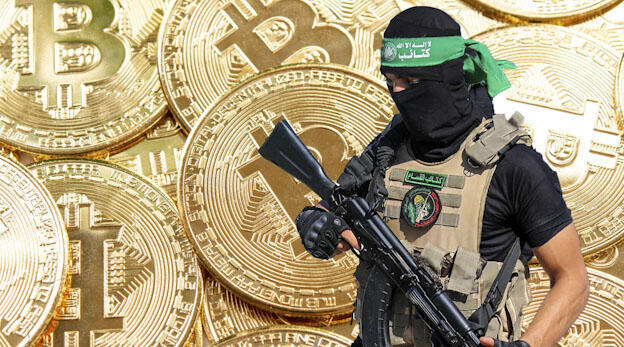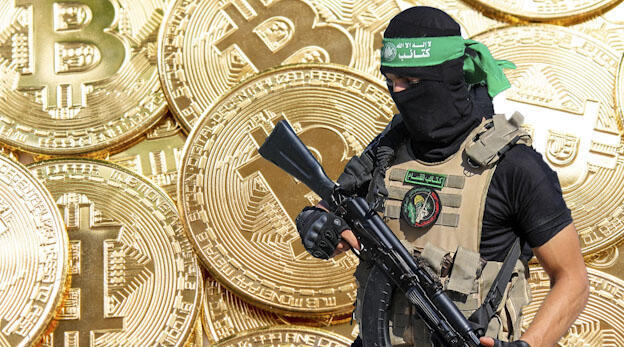
ISRAEL AT WAR
Digital Frontline: How Hamas leveraged cryptocurrencies for fundraising
An exploration of Hamas' transition to cryptocurrencies in response to financial sanctions
An initiative led by the Israel Police in collaboration with local tech and crypto industry activists resulted in the freezing of crypto accounts, PayPal, and bank transactions intended for Hamas fundraising among the public. To speedily garner funds, Hamas had shared various account numbers and wallets on Telegram channels as part of a rapid crowdfunding campaign. The Israel Police, alongside the cyber unit of Lahav 433, the National Bureau for Counter Terror Financing of Israel (NBCTF) under the Ministry of Defense, the Shin Bet, and other intelligence agencies, launched a joint operation in response.
With the outbreak of war, Hamas initiated a social media fundraising campaign, urging the public to deposit cryptocurrencies into its accounts. The cyber unit and NBCTF swiftly located and froze these accounts, with the assistance of the crypto exchange Binance, and transferred the funds to the state treasury.
Over the years, Israel has consistently taken measures against Hamas' fundraising efforts on social media, especially in the realm of cryptocurrencies. These digital assets provide a degree of user anonymity and allow for cross-border financial transfers, which aren't tightly regulated by international authorities. Since Hamas has been designated a terrorist entity by the U.S., the EU, and Western countries, it faced economic sanctions, including exclusion from the global banking system. As the crypto market expanded, Hamas transitioned to these digital assets to manage its finances.
Hamas' transition to actively using crypto began about four years ago, in order to overcome what was perceived as the "financial blockade" imposed by Israel on Hamas. On January 31, 2019, Abu Ubaydah, the spokesman for the Az ad-Din al-Qassam Brigades, the military wing of Hamas, announced that Hamas had begun accepting donations in Bitcoin, and published the link to wallets associated with the organization. Among the addresses identified were those linked to the crypto exchange Binance, and others linked to the largest American crypto exchange - Coinbase. This public move led Binance to close the wallet linked to Hamas on several occasions.
In accordance with the increase in the use of crypto, the Israeli struggle in this channel is also ongoing. In July 2021, Israel seized crypto-currencies belonging to Hamas for the first time, in January 2022, a second seizure took place, after then-Defense Minister Benny Gantz signed an order to seize cryptocurrencies with a value of approximately one million dollars. "The intelligence, technological and legal tools that allow us to get our hands on terrorist funds around the world constitute an operational breakthrough," Gantz said at the time. Last April, Hamas announced a halt to accepting donations in bitcoin on Telegram, for "the safety of the donors... especially in light of the increasing hostile effort against anyone who tries to support using this currency."
Israel is working on the issue of monitoring and freezing crypto accounts not only towards Hamas, and last June Defense Minister Yoav Galant announced that Israel seized $1.7 million from crypto accounts linked to the Quds Force of Iran's Islamic Revolutionary Guard Corps. Then the Head of the National Bureau for Counter Terror Financing (NBCTF) of Israel, Paul Landes, admitted that the seizure was made in cooperation with crypto companies, including Binance and the analysis company Chainalysis. "We see crypto companies as partners, or at the very least we see them as gatekeepers," he said to Fortune at the time. "They want to cooperate because they are afraid of the risk of being connected to terrorism and financial terrorism - they want the industry to be clean."
Binance's name comes up again and again and not by chance. The world's largest crypto exchange is also one that deliberately works to avoid regulatory oversight worldwide. The company does not have one clear headquarters, and maintains an extensive geographical dispersion to avoid associating itself and subjecting its activities to a single regulatory system.
In the last year, with the collapse of the crypto market, greater regulatory pressure began to be exerted on the exchange, especially in the U.S. where various lawsuits are being brought against the exchange and also personally against its founder and CEO Changpeng Zhao (based on the assumption that it used geographic obfuscation as a tool to avoid compliance to local rules). In one lawsuit filed against it by the US Commodity Futures Trading Commission (CFTC) last March, the regulator implied that Binance engaged in activities that could be perceived as criminal, including money laundering.
For Hamas, the choice of Binance may be natural due to the size of the exchange, its popularity, trading volumes and the regulatory ambiguity in which it operates, but it is also certainly not the only exchange through which it moves funds. In fact, as long as it transfers the cryptocurrencies between different platforms, it can avoid being identified as the owner of the accounts and seizing the assets for a long time. Not only that, but already today there are decentralized platforms that the state or other authorities cannot take over or cause to be frozen or closed. And there are even more anonymous currencies than Bitcoin, which are particularly difficult for the state to trace. But even this strategy has severe limitations: it is more difficult to buy anonymous coins in particular, and the decentralized exchanges suffer from low trading volumes and their navigation is cumbersome and usually appeals to sophisticated users. These are further barriers for the general public to mobilize for crowdfunding projects, and they also slow down Hamas' ability to raise quick capital from around the world.














